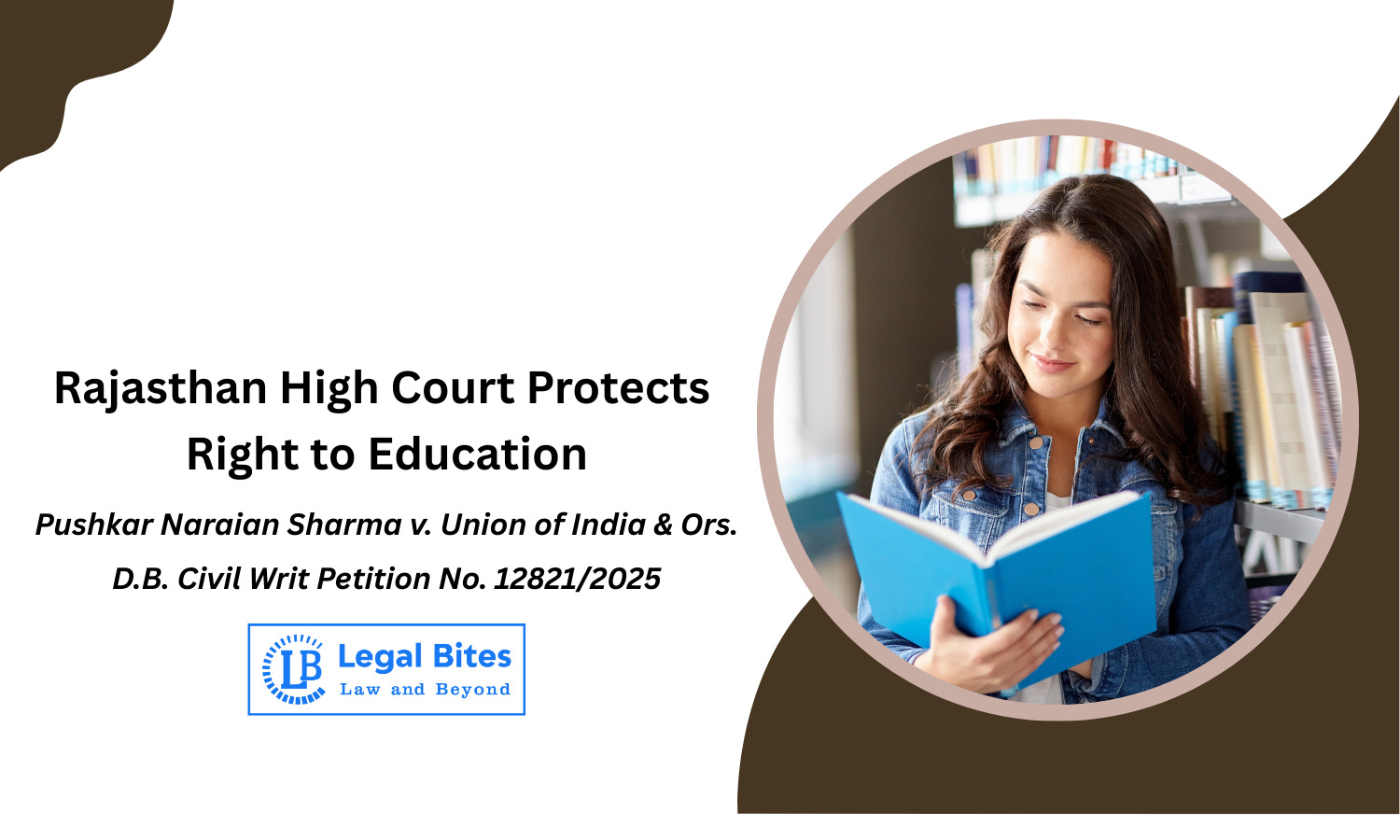
Rajasthan High Court, in a significant judgment delivered on 10 September 2025, underscored the importance of the right to education and family welfare by setting aside the order of the Central Administrative Tribunal (CAT), Jaipur. The case, Pushkar Naraian Sharma v. Union of India & Ors. (D.B. Civil Writ Petition No. 12821/2025), dealt with the transfer of a BSNL Sub-Divisional Engineer from Jaipur to Karnataka, which the Court found detrimental to his daughter’s Class XII board examination preparations.
This judgment highlights the judiciary’s insistence on a compassionate approach in administrative decisions, especially when they intersect with constitutional guarantees under Article 21—the right to life and personal liberty. It also reflects the Court’s concern that governmental campaigns like “Beti Bachao, Beti Padhao” should not remain hollow slogans but must translate into sensitive governance practices.
Factual Background
- Petitioner: Pushkar Naraian Sharma, Sub-Divisional Engineer, BSNL, posted in Rajasthan Circle for over 23 years.
- Transfer Order: He was transferred to the Karnataka Circle in 2025.
- Representation: Sharma requested retention at Jaipur until March 2026, citing his daughter’s Class XII Board Examinations, arguing that shifting her mid-session would severely disrupt her studies.
- CAT’s Decision: The Central Administrative Tribunal rejected his plea on 8 August 2025, stating that he had already served a long tenure in Jaipur and the department had the authority to transfer him.
Dissatisfied, Sharma approached the Rajasthan High Court.
Issues Before the Court
- Whether the denial of retention in Jaipur until completion of the petitioner’s daughter’s education was arbitrary and violative of the principles of natural justice.
- Whether the transfer policy of 2008, which permits retention on educational grounds (Classes X and XII), was overlooked.
- Whether the State, as a welfare entity, has an obligation to protect the educational rights of children and the mental well-being of employees’ families under Article 21.
Arguments
Petitioner’s Contentions
- The transfer policy (2008) allows employees to seek retention until the end of the academic year if their children are in Classes X or XII.
- The CAT failed to consider this policy and rejected his plea merely based on his long tenure in Jaipur.
- Forcing a transfer during his daughter’s crucial academic year would not only disrupt her studies but also cause undue mental stress to the family.
Respondents’ Contentions
- Counsel for BSNL argued that entertaining such requests would open floodgates since numerous employees cite similar grounds.
- The petitioner had already served at one station for 23 years, and the department was within its rights to order the transfer.
- Clause 6.6 of the transfer policy relating to educational retention was under consideration but not formally implemented.
Judgment and Reasoning
The Division Bench comprising Justice Sanjeev Prakash Sharma and Justice Sanjeet Purohit ruled in favour of the petitioner, making the following key observations:
Transfer Policy Consideration
- The Court emphasised that the 2008 transfer policy specifically acknowledges the importance of educational continuity for children in critical classes.
- Even if the clause was claimed to be “under introduction,” the spirit of the policy warranted compassionate consideration.
Right to Education and Article 21
- The Court held that denying retention in such circumstances undermines both the child’s right to education and the family’s right to live with dignity under Article 21.
- The welfare obligations of the State extend not only to employees but also to their dependents.
Campaigns v. Reality
- The Bench strongly remarked that while the government promotes “Beti Bachao, Beti Padhao,” in practice, its authorities often remain “immune to the requirements of such girls.”
- Administrative decisions must reflect sensitivity toward the educational needs of children, especially daughters preparing for board examinations.
Balance Between Administration and Welfare
- While transfers are an administrative prerogative, the Court clarified that such powers cannot be exercised in a manner that causes disproportionate hardship to employees and their families.
Final Order
- The CAT’s order dated 8 August 2025 was set aside.
- The petitioner was allowed to continue in Jaipur until March 2026, after which the department would be free to relieve him to join in Karnataka.
- The relieving order dated 31 July 2025 was also quashed.
Significance of the Judgment
Judicial Recognition of Family Needs
- The decision reiterates that transfer policies must be interpreted humanely, especially when children’s education is at stake.
Strengthening the Right to Education
- The ruling expands the scope of Article 21, emphasising that the mental health and educational environment of employees’ families form part of the right to life.
Accountability in Governance
- Government departments cannot hide behind administrative convenience to deny genuine requests.
- The Court reminded authorities that welfare policies like “Beti Padhao” should find real expression in everyday decisions.
Precedent for Future Cases
- This ruling sets a precedent for employees across India facing similar difficulties, ensuring that the educational concerns of children, particularly in Classes X and XII, receive due weightage in transfer matters.
Conclusion
The Rajasthan High Court’s judgment in Pushkar Naraian Sharma v. Union of India & Ors. is a landmark in balancing administrative prerogatives with human concerns. By halting the transfer of an employee for the sake of his daughter’s education, the Court reaffirmed that family welfare, education, and mental health are intrinsic to Article 21 rights.
This case sends a clear message: State policies and campaigns must translate into action. Protecting a girl’s education during crucial board exams is not merely a parental duty but also a constitutional and societal responsibility.
Important Link
Law Library: Notes and Study Material for LLB, LLM, Judiciary, and Entrance Exams